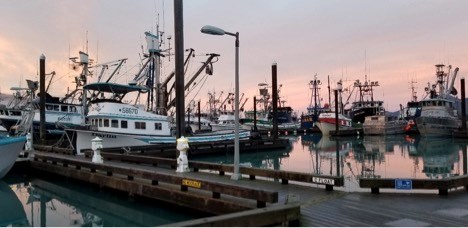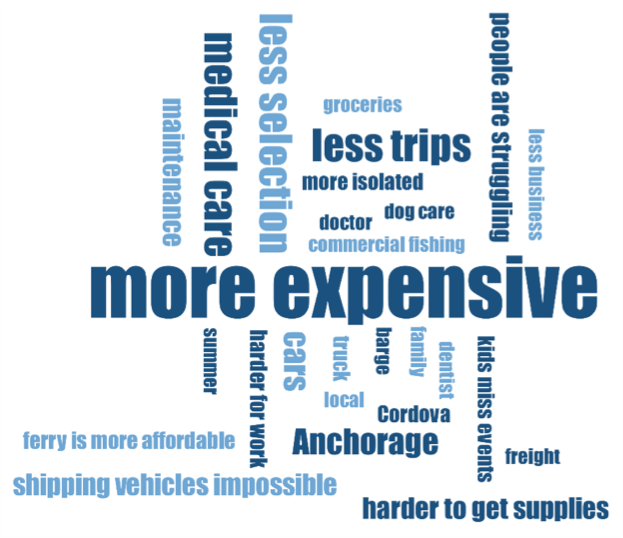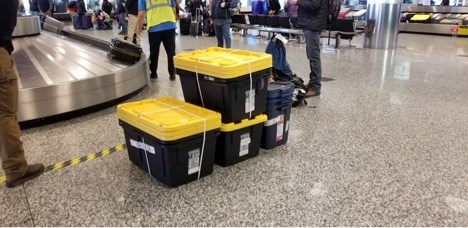30 April 2020
By Barbara Johnson and Jennifer I. Schmidt
In March 2020, as the first warm rays of sun hit Orca Inlet, Cordova started to emerge from a ferry-less winter. The Alaska Marine Highway System (AMHS) is used by 30 communities for reliable and affordable year-round transportation. But, following the passage of the FY 2020 budget, the Alaska Legislature cut funding for the AMHS by $44 million dollars, a 31% reduction from previous fiscal years. As a result, according to the Alaska Municipal League, many coastal communities, including Cordova (Figure 1), spent six to eight months with no ferry service during the 2019/2020 winter. Additional funding for the AMHS is included in the FY21 state budget, but Cordova will likely have to wait until July 2020 for the first ferry of the year. By that time, Cordova will have been without ferry service for 9.5 months.
 Figure 1. Fishing docks of Cordova. Picture credit: Jennifer Schmidt
Figure 1. Fishing docks of Cordova. Picture credit: Jennifer Schmidt
The economic impact of AMHS is significant and every dollar invested in AMHS results in $2 in economic benefits. In 2014, the state of Alaska allocated $117 million to fund AMHS operations which resulted in an economic impact of $273 million. The economic benefits are felt throughout Alaskan coastal communities, including Anchorage. According to Cordova mayor Clay Koplin, Anchorage has a larger net gain from the ferry than Cordova thanks to the transportation of seafood and other businesses. For example, when the ferry is operating, a local restaurant owner travels to Anchorage every two-weeks and buys $20,000 worth of supplies for his business.
Fifty Cordova households participated in a survey to examine Food-Energy-Water connections and security in rural communities. One question asked was, “Have the ferry cuts affected you?”, and the almost unanimous response was a resounding “Yes.” A word cloud of the themes that emerged from the interview highlights that people are encountering higher living costs, and, in general, higher costs for everything since non-ferry travel is more expensive (Figure 2). Which, in an off-road community like Cordova, impacts every aspect of life.

Figure 2. Word cloud from interviews conducted in March 2020 about ferry cut impacts.
Ferry operations to Anchorage are key to lowering living costs in Cordova. When the ferry is operational, Cordova residents load their vehicles and families on the ferry and head to Anchorage, at a cost of ~$70/person. When flying, families pay $150/person or more to go to Anchorage and must rent a car upon arrival, further increasing travel costs. And for some people, such as a Cordova wheelchair user, car rentals are not an option as s/he requires a vehicle adapted to individual needs.
During trips to Anchorage, people seek medical care, schedule dental work, visit veterinarians with their pets, and stock up on groceries. When flying, people bring some groceries back in totes, a ubiquitous sight when traveling to rural Alaska (see picture). But when traveling by ferry, entire vehicles are filled with groceries, allowing people to stock up for months ahead. As one commercial fisherman told us, he “can’t gear up for fishing season with affordable provisions for our vessel…”.

Figure 3. Totes used as luggage by airline passengers from Cordova to transport goods back from Anchorage, Alaska by air instead of the ferry. Photo credit: Jennifer Schmidt.
The lack of ferry service decreases the amount and types of goods that can be shipped (Figure 3). People must purchase more groceries locally, and while local stores are trying to meet demands, some are difficult to achieve like fresh fruits and vegetables. Store shelves are less varied, and the bulk section is often empty. Every business in Cordova is impacted. A small-business owner described needing chemicals that cannot be transported on planes at the concentration she generally buys. She now purchases the chemical at a lower concentration, which significantly increases her costs. Others are struggling to ship their equipment in time for the summer field season.
Without the ferry, shipping items from Cordova is also more expensive and impacts people’s ability to repair and maintain their vehicles. One person described patching up her car, crossing her fingers that she can keep it running until the ferry starts operating again. Several people mentioned delaying maintenance, for their personal and work vehicles. Another person described her frustration at trying to convey to the loan company that she was unable to drive her car to Anchorage at the end of its lease, because there is no road, and no ferry.
The ferry service is integral to Cordova’s economy. Many out of state fishermen use the ferry to travel to Cordova, bringing along their families and RVs for a fishing season. With fewer ferry options, some residents worry the fishermen will not come. Many businesses, such as net repair services, depend on fishermen. Revenue from the fish tax from fish delivered to the local fish processor covers more than 11% of the City of Cordova’s expenses. Without the ferry there is fear that commercial fishermen will take their fish to processors in other communities, thus greatly reducing vital funding for Cordova. Fewer businesses were open over the winter than in the past, and people pinpointed a decrease in the number of people traveling through town as the cause. Others are struggling to fill positions, as people are unwilling to move to a fly-only town.
The cuts to the ferry impact people’s well-being. Many residents feel more isolated, and some feel depressed. As travel to and from Cordova is more expensive, people limit their trips and visit their family less often, and children travel less for school events. Medical and veterinary care is more expensive and harder to receive without the ferry. When the ferry is operational, entire families travel to Anchorage at once, and parents schedule several medical appointments, ensuring a parent is always available to watch over the children. When flying, only one parent accompanies a child to medical appointments in Anchorage, limiting childcare availability when traveling. A woman cried as she shared that her dog had died because, without the ferry, she could not get it to a vet in Anchorage.
The start of the ferry operations in May 2020 was expected to bring some relief after a tough winter. But, soon after the conclusion of the surveys, COVID-19 reached Alaska, and oil prices plummeted. As the state hunkers down to flatten the curve, Cordova residents and other ferry-dependent coastal communities worry about whether they will ever see a regular ferry in 2020.

Get notified when new articles are posted.